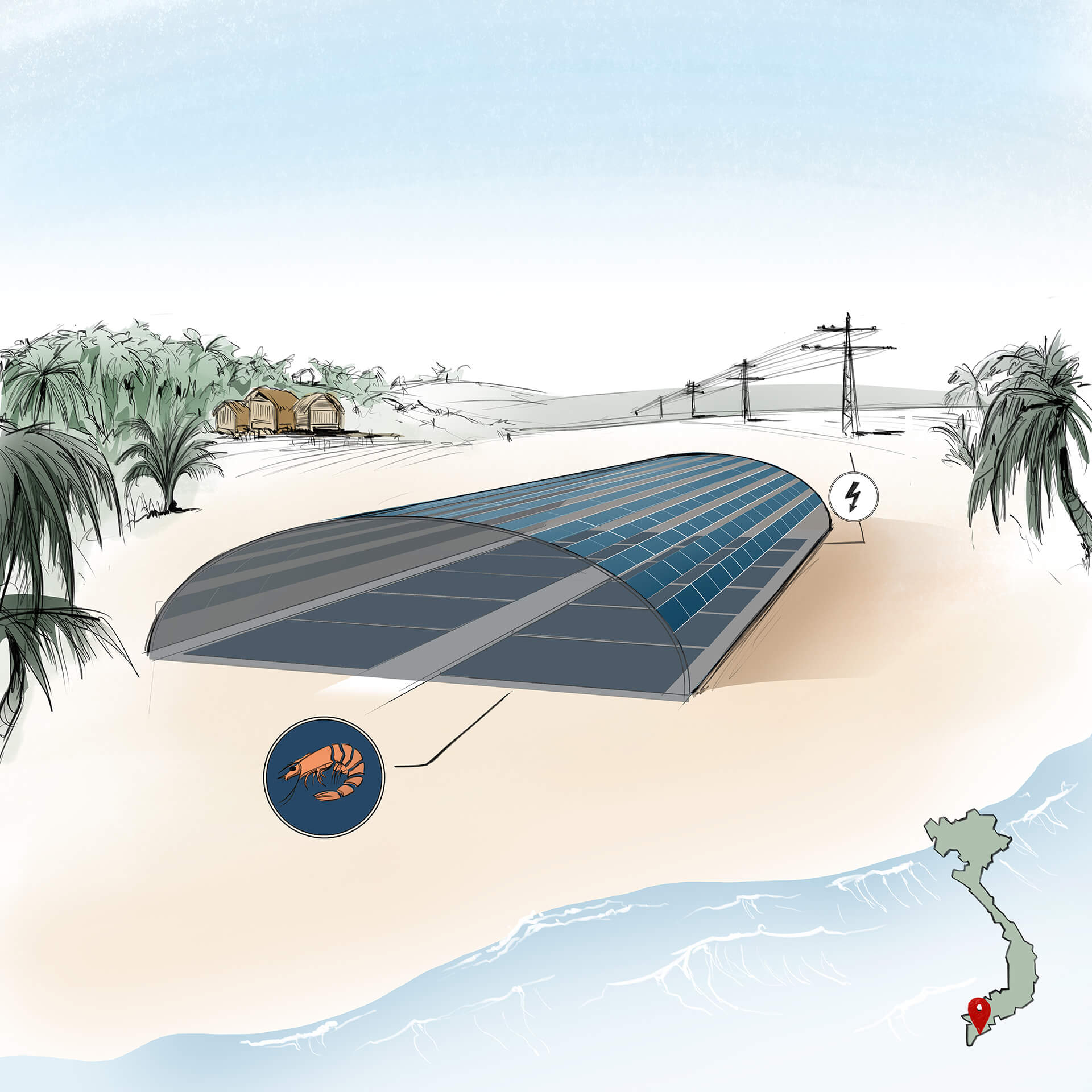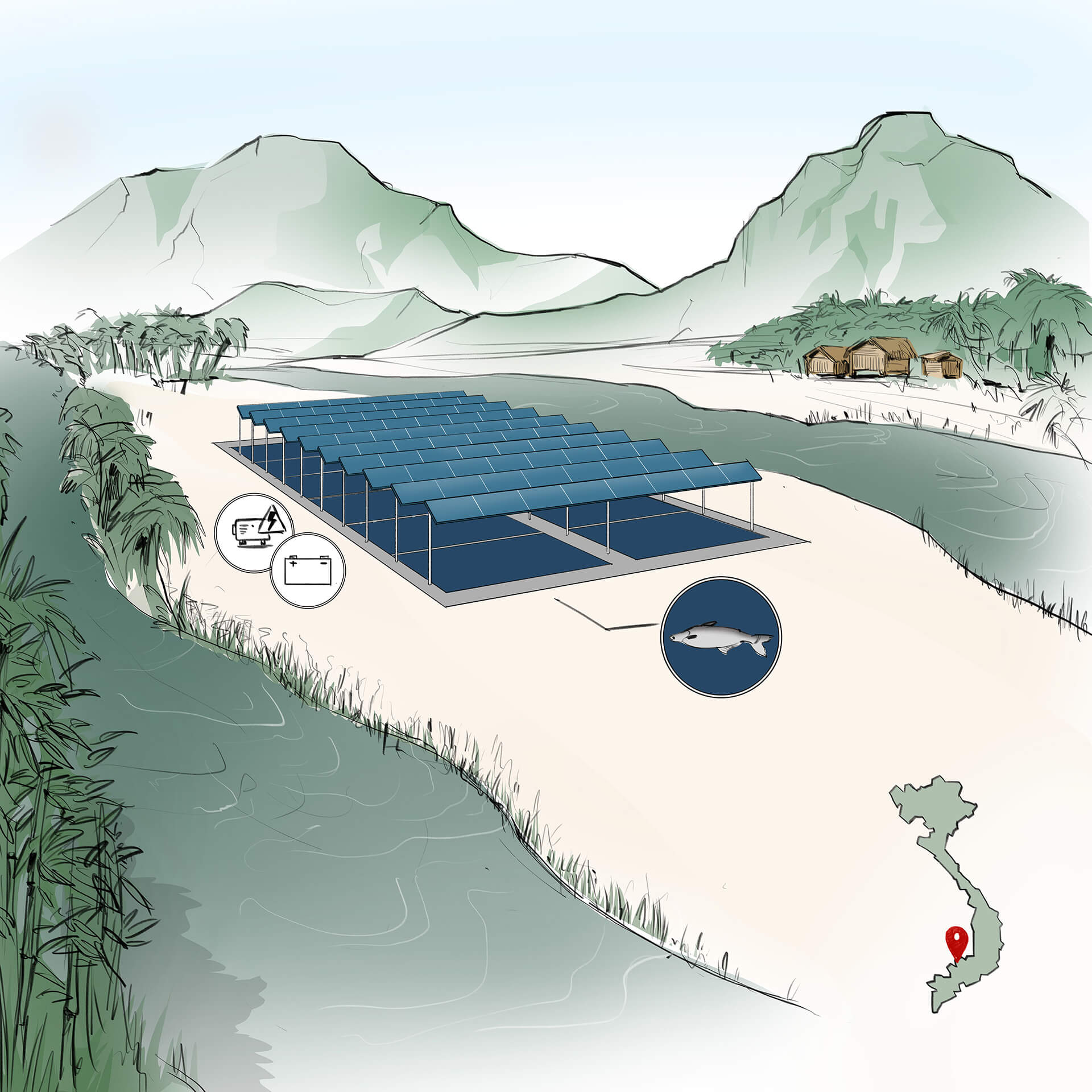Aqua-PV: “SHRIMPS” Project Combines Aquaculture and Photovoltaics
Like other countries in Southeast Asia, Vietnam is experiencing strong economic and population growth. Its energy demand is currently increasing by ten percent each year and the competition for land use is growing as a result. With the project “SHRIMPS” (Solar-Aquaculture Habitats as Resource-Efficient and Integrated Multilayer Production Systems), the Fraunhofer Institute for Solar Energy Systems ISE and its partners want to demonstrate that dual land use for aquaculture and photovoltaics can solve these systemic problems. Pilot plants are being installed and tested along the Mekong’s upper basin and in the Mekong Delta.


Fraunhofer ISE had already carried out a pre-feasibility study on the potential for combining shrimp farming with photovoltaics in Vietnam’s Mekong Delta in 2018 on behalf of GIZ, a German service provider in the field of international cooperation. It is now testing the technical and commercial feasibility of dual land use for solar power generation and commercial aquaculture on a shrimp farm run by Vietnam’s national market leader Viet Uc Seafood.
For reasons of hygiene, more and more aquaculture facilities in Southeast Asia are covered with closed greenhouses to prevent the introduction of diseases by birds or other aquatic animals. Theoretically, these canopies allow the integration of solar modules.
The scientists involved in the project consider on-land shrimp farming in closed systems to be a promising approach to the careful use of land and water resources in the region. This more efficient use of land helps to preserve the remaining mangrove forests and significantly reduces water consumption. In addition, the use of antibiotics is reduced to a minimum thanks to the sealed environment and the biofloc system, where the shrimp are fed on micro-organisms in a closed loop. By providing shade, the solar modules integrated into the housing improve working conditions for the employees at the facility. They also offer protection from predators and maintain a lower water temperature enhancing shrimp growth. According to initial analyses, the 1-megawatt pilot plant in Bac Lieu should reduce CO2 emissions by about 15,000 metric tons each year and cut water consumption by 75 percent compared to that of a conventional shrimp farm.
Another plant with a 400-kW capacity is being installed above a freshwater basin where pangasius are bred. The solar modules are to be elevated above the surface of the water, which will reduce water consumption via evaporation as well as protecting the fish from predatory birds.
One hundred percent of the solar power generated will be used by the pangasius farm itself, as the plant is a hybrid designed for off-grid operation. This will significantly reduce the need for diesel typically used for powering the farm. “We want to use this project to demonstrate the added value that can be generated by integrating photovoltaics into different areas of life,” explains project manager Maximilian Trommsdorff of Fraunhofer ISE. This is particularly true for aquaculture, he says. “For Aqua-PV, we’re currently working on the assumption that the land use rate can be almost doubled compared with a ground-mounted PV system alone.”
The project is set to run for three years and will begin with simulations looking at small systems before the two larger plants are built. “In the third step we’ll then scale down again to develop a solution for small and medium-sized aquaculture businesses. This will make the approach accessible for the average rural inhabitant in terms of the technology and investment needed,” Trommsdorff adds. The market launch of the Aqua-PV technology combined with the efforts of local partners should help drive improvements to energy security in the region as well as boosting its economy. With aquaculture and photovoltaics experiencing rapid growth worldwide, the project team believes that their approach has a lot to offer for many other developing and industrializing nations.
As part of Germany’s development cooperation efforts in Vietnam, GIZ conducts further work in the field of renewable energies as well as in coastal protection and agriculture in the Mekong Delta. Fraunhofer ISE and GIZ developed the research approach and project proposal on the basis of findings from this work. The Federal Ministry of Education and Research supports the project within the framework programme "Research for Sustainable Development" (FONA3) by supporting the research and development activities of the partners SMA Sunbelt Energy GmbH, Suntrace GmbH, Fraunhofer ISE and the German Thünen Institute of Fisheries Ecology.
Further partners of the bilaterally financed project on the Vietnamese side are the Nong Lam University, the Vietnamese Institute of Energy and the Viet Uc Seafood Corporation.
Last modified: